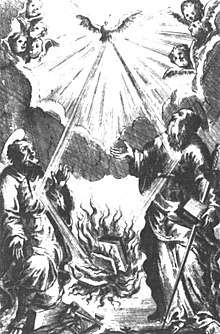Monarchianism
Monarchianism is a Christian theology that emphasizes God as one person,[1][2][3] in direct contrast to Trinitarianism which defines God as three persons coexisting consubstantially as one in being.[4]
History
All Christians are monotheists who believe in the unity of God.[2][5] During the patristic period, Christian theologians attempted to clarify the relationship between God the Father, God the Son and the Holy Spirit.[6] Monarchianism developed in the 2nd century and persisted into the 3rd century.[1] The term Monarchianism derives from the Greek word meaning "a single principle of authority", and monarchians were concerned with defending the absolute unity of God against ideas such as the Trinity, which they feared would lead to tritheism.[7]
Monarchians were opposed by Logos theologians (Tertullian, Hippolytus, Clement of Alexandria, and Origen of Alexandria), and gradually the Trinitarian view gained prominence and was adopted at the First Council of Constantinople in 381.[8] Monarchianism was generally considered a heresy after the 4th century.[1]
Types
Two types of monarchianism were propounded.[1] Modalistic monarchianism (or Modalism) considers God to be one while appearing and working through the different "modes" of Father, Son, and Holy Spirit. Following this view, all the Godhead is understood to dwell in the person of Jesus from the incarnation. The terms Father and Son are then used to describe the distinction between the transcendence of God and the incarnation. Lastly, since God is a spirit, it is held that the Holy Spirit should not be understood as a separate entity but rather to describe God in action. Notable adherents included Noetus, Praxeas, and Sabellius, hence the view is commonly called Sabellianism. Nevertheless, Sabellius's writings did not survive, so little is known about his beliefs.
Adoptionism (or dynamic monarchianism) holds that God is one being, above all else, wholly indivisible, and of one nature. It holds that the Son was not co-eternal with the Father, and that Jesus Christ was essentially granted godhood (adopted) for the plans of God and for his own perfect life and works. Different variations of Dynamism hold that Jesus was "adopted" either at the time of his baptism or his ascension. Notable adherents included Theodotus of Byzantium[2] and Paul of Samosata, a bishop of Antioch.
The name "Monarchian" properly does not strictly apply to the Adoptionists, or Dynamists, as they (the latter) "did not start from the monarchy of God, and their doctrine is strictly Christological".[9]
See also
- Arianism
- Monarchian Prologue
- Monism
- Nicene Christianity
- Subordinationism
- Unitarianism
References
- Encyclopædia Britannica: Monarchianism
- Monarchians at Catholic Encyclopedia, newadvent.org
- Oxford Dictionary of the Christian Church (Oxford University Press 2005 ISBN 978-0-19-280290-3): Monarchianism
- Knight, Kevin (ed.), "The dogma of the Trinity", Catholic Encyclopedia, New Advent
- Oxford Dictionary of the Christian Church (Oxford University Press 2005 ISBN 978-0-19-280290-3): Monarchianism
- McGrath 2013, p. 54.
- McGrath 2013, p. 56–57.
- The SCM Press A-Z of Patristic Theology, entry Monarchianism, p. 227
- Catholic Encyclopedia - Monarchians Archived 2013-01-29 at the Wayback Machine
Sources
- McGrath, Alister E. (2013). Historical Theology: An Introduction to the History of Christian Thought (2nd ed.). Wiley-Blackwell. ISBN 978-0-470-67286-0.CS1 maint: ref=harv (link)
External links

